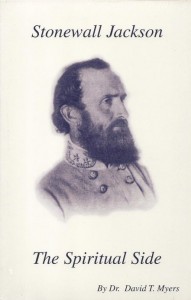Stonewall Jackson: The Spiritual Side
Stonewall Jackson: The Spiritual Side
by Dr. David T Myers – Sprinkle Publications
This study is thoughtfully done, exploring a variety of aspects of the great general’s life. It is historically accurate and gives fresh insight into the genius of the ‘mighty Stonewall’. It will profit any believer, not just those interested int he Civil War or military history. It is to be hoped that other such studies on notable personalities of faith will be stimulated hereby. I whole-heartedly recommend it. – Rand W. Hackenburg, Assistant Curator, U.S. Army Military History Institute, Carlisle, PA
Thomas Jonathan Jackson was born on January 21, 1824 in Clarksburg, Virginia. He entered West Point in July 1842 and, in spite of his poor childhood education, worked hard to graduate seventeenth in his class in 1846. Upon graduation, Jackson was sent on military duty to Mexico, and continued his service in the United States Army in positions in New York and Florida. In 1851, Jackson became professor of artillery tactics and natural philosophy at Virginia Military Institute in Lexington, Virginia. He resigned from the army as of February 29, 1852.
It was during the Battle of Bull Run in the Civil War when Jackson assumed his nickname. Amidst the tumult of battle, Brigadeer-General Barnard E. Bee stated, “There is Jackson standing like a stone wall.” As the war continued, Jackson continually impressed his Confederate compatriots with his skill on the battlefield and in planning conferences. He distinguished himself in the Valley campaign of early 1862, the Battle of second Manassas in August 1862, and the Battle of Fredericksburg in December 1862. Jackson was a Southern hero, and in spite of his eccentricities, he was loved and respected by his soldiers. He strictly observed the Sabbath, and his religiousity was constant in all facets of his life.
On May 2, 1863, in his last march of the Civil War, Jackson was wounded by friendly fire. He died of pneumonia several days later on May 10 at Guiney’s Station, Virginia. His body was carried to Richmond and then to Lexington where it was buried.
sources: Dictionary of American Biography
Now available in our bookstore! Visit the FPP Store





